If you’re interested in learning about artificial intelligence, then you’re in luck. MIT is offering 12 free online courses on the subject. These courses cover a wide range of topics, from machine learning to natural language processing.
Whether you’re a beginner or an experienced AI professional, there’s a course here for you. And the best part is, they’re all free! So what are you waiting for? Start learning today!
These courses are taught by some of the leading experts in the field of AI, and they cover the latest research and developments. So if you’re serious about learning about AI, then these courses are a great place to start!
1. Introduction to Computer Science and Programming Using Python
- Foundational Concepts: This course serves as a comprehensive introduction to fundamental concepts in computer science, providing students with a solid understanding of programming, algorithms, data structures, and problem-solving techniques.
- Python Programming: The course primarily utilizes the Python programming language as a vehicle for teaching these concepts. Python’s simplicity and readability make it an excellent choice for beginners, enabling students to focus on learning the core concepts without getting bogged down in complex syntax.
- Algorithmic Thinking: Students learn how to think algorithmically, breaking down complex problems into smaller, manageable steps. They gain experience in designing, implementing, and analyzing algorithms, which are essential skills for software development and problem-solving.
- Data Structures: The course covers a range of data structures such as lists, arrays, stacks, queues, and dictionaries. Students learn when and how to use these structures effectively to organize and manipulate data, which is crucial for building efficient programs.
- Practical Applications: Throughout the course, students work on coding assignments and projects that emphasize real-world applications. This could include creating simple games, text processing tools, or even basic web applications. By applying what they’ve learned, students gain hands-on experience and reinforce their understanding of the concepts.
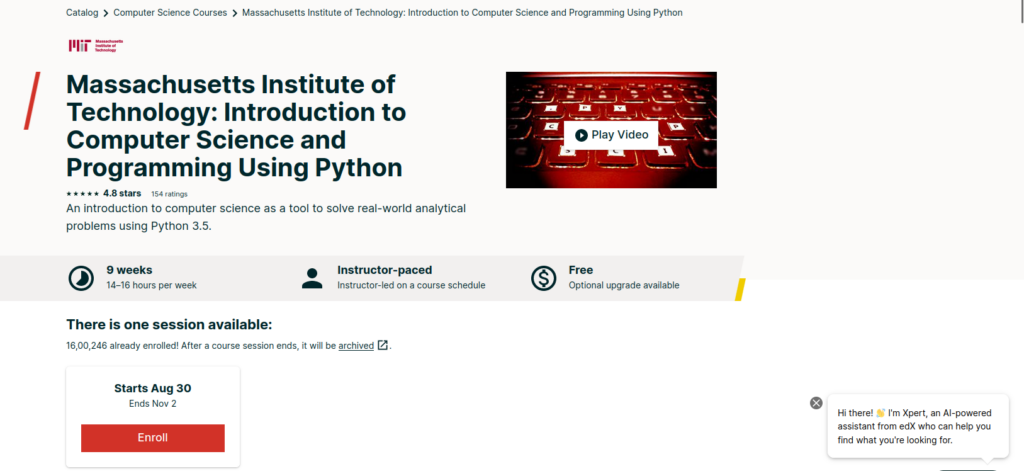
2. Introduction to Computational Thinking and Data Science
- Computational Thinking Overview: This topic introduces the concept of computational thinking, which involves breaking down complex problems into smaller, more manageable parts that can be solved using computational techniques. It emphasizes problem-solving strategies that draw parallels from computer science, such as decomposition, pattern recognition, abstraction, and algorithm design.
- Data Science Fundamentals: This area delves into the foundational principles of data science, including data collection, cleaning, exploration, visualization, and analysis. Students learn to extract meaningful insights from datasets by applying statistical methods, data visualization tools, and exploratory data analysis techniques.
- Data Manipulation and Analysis: Students are introduced to programming languages like Python or R, and libraries like Pandas and NumPy, which are essential for data manipulation and analysis. They learn how to load, clean, and transform data, as well as perform various operations, computations, and aggregations on datasets.
- Statistical Concepts: The topic covers key statistical concepts required for data analysis, such as measures of central tendency, variance, distribution, and hypothesis testing. Understanding these concepts enables students to make informed decisions based on data-driven insights and effectively communicate their findings.
- Real-world Applications: The course emphasizes applying computational thinking and data science techniques to real-world problems. Students work on projects that involve analyzing real datasets to gain insights, make predictions, or solve specific challenges. This practical experience helps bridge the gap between theoretical concepts and their practical applications.
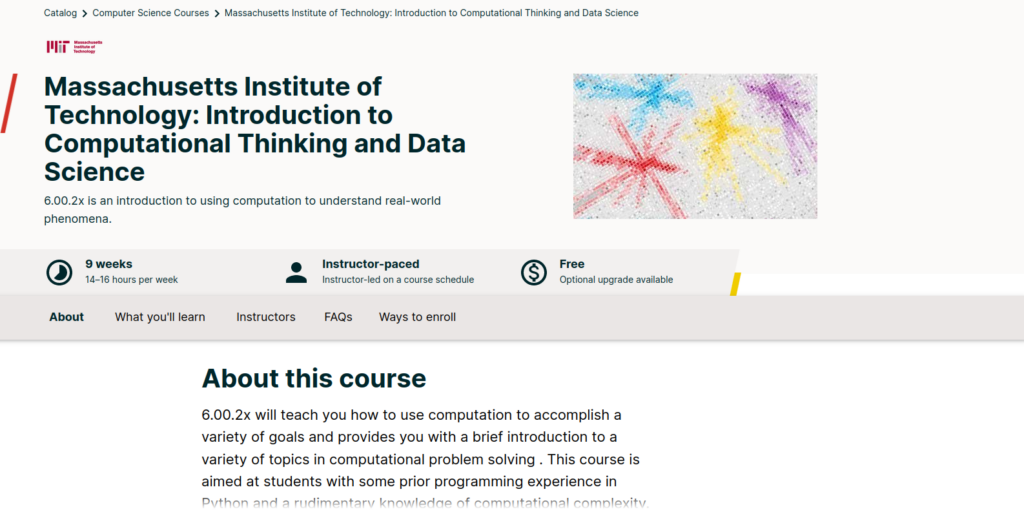
3. Machine Learning with Python
1.Fundamentals of Machine Learning: This course provides a comprehensive introduction to the fundamental concepts of machine learning. Students learn about different types of machine learning algorithms, such as supervised learning, unsupervised learning, and reinforcement learning, and understand how these algorithms can be used to make predictions, cluster data, and optimize decisions.
2.Python Programming for Machine Learning: The course focuses on using Python as the primary programming language for implementing machine learning algorithms. Students gain hands-on experience with popular libraries like scikit-learn, TensorFlow, and Keras, which offer a wide range of tools and functions for building and training machine learning models.
3.Data Preprocessing and Feature Engineering: Before feeding data into machine learning models, it’s crucial to preprocess and clean the data. This course covers techniques for data cleaning, handling missing values, and transforming features to make them suitable for machine learning. Feature engineering, which involves creating new features from existing ones, is also explored to enhance model performance.
4..Model Selection and Evaluation: Students learn how to choose appropriate machine learning algorithms for different types of problems and datasets. They explore techniques for evaluating model performance, including metrics like accuracy, precision, recall, and F1-score. Cross-validation and hyperparameter tuning are also covered to optimize model generalization.
5.Real-world Projects: The course often includes hands-on projects that allow students to apply their knowledge to real-world problems. These projects could involve tasks like image classification, text sentiment analysis, recommendation systems, or even building simple predictive models. By completing these projects, students gain practical experience and a deeper understanding of machine learning concepts.
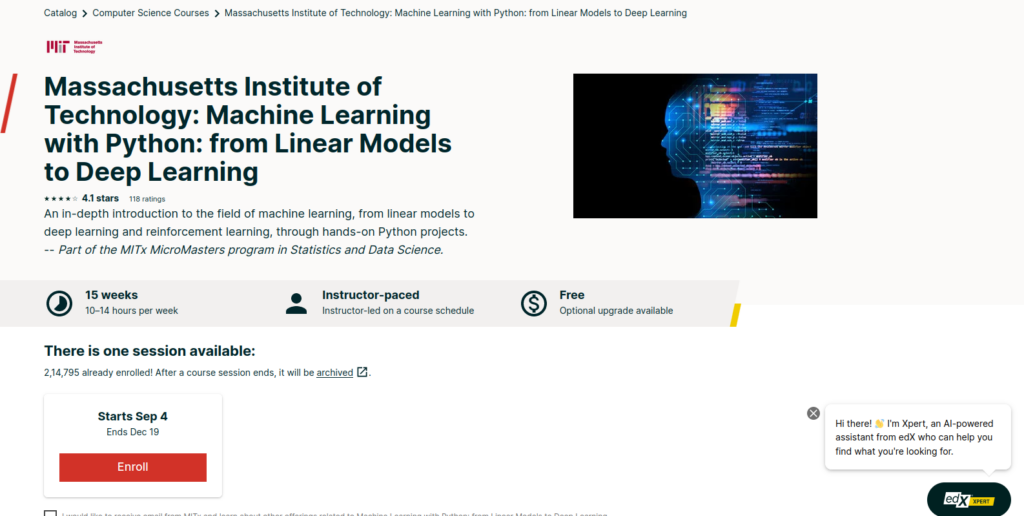
4. Supply Chain Analytics.
- Understanding Supply Chain Dynamics: This course provides a comprehensive overview of supply chain management, covering the end-to-end process of sourcing, production, distribution, and delivery of goods and services. Students gain insights into the complexities and challenges of managing supply chains in various industries.
- Data-driven Decision Making: The course focuses on using data analytics to make informed decisions within the supply chain. Students learn how to collect and analyze data related to inventory levels, demand forecasting, lead times, production schedules, transportation costs, and more. These insights help optimize supply chain operations and enhance efficiency.
- Demand Forecasting and Inventory Management: Students delve into demand forecasting techniques, understanding how to predict future demand based on historical data and market trends. They also explore inventory management strategies, balancing the costs of holding excess inventory with the risks of stockouts to achieve optimal levels.
- Logistics and Distribution Optimization: Supply chain logistics are a critical component, and this course covers methods to optimize transportation, distribution, and routing decisions. Students learn about network design, transportation modes, and last-mile delivery solutions to streamline the movement of goods from suppliers to consumers.
- Risk Management and Resilience: Supply chains are susceptible to disruptions from various factors such as natural disasters, geopolitical events, and economic fluctuations. Students learn strategies to assess and mitigate these risks, ensuring the supply chain remains resilient and can adapt to unforeseen challenges.
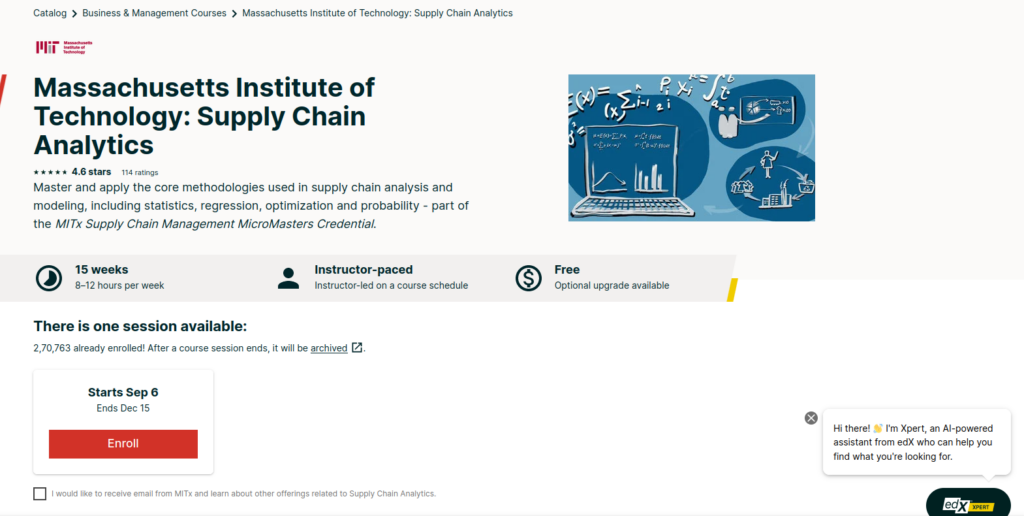
5. Understanding the World Through Data
- Data Literacy and Interpretation: This course focuses on building data literacy, teaching students how to read, interpret, and critically analyze data in various forms such as charts, graphs, tables, and textual information. Students learn to extract meaningful insights from data and recognize potential biases or misrepresentations.
- Exploratory Data Analysis: Students delve into exploratory data analysis techniques, learning how to visually and statistically explore datasets to uncover patterns, trends, and relationships. They use tools like data visualization libraries and statistical methods to gain a deeper understanding of the information contained within the data.
- Statistical Concepts for Everyday Life: The course covers fundamental statistical concepts that are relevant to understanding the world around us. Students learn about measures of central tendency, variability, correlation, regression, and hypothesis testing. These concepts enable them to analyze data and draw meaningful conclusions.
- Real-world Applications: The course often includes real-world case studies and examples that demonstrate how data is used to inform decisions and shape our understanding of various phenomena. This could range from analyzing economic trends and social issues to interpreting scientific experiments and making informed consumer choices.
- Data Ethics and Communication: Students explore the ethical considerations associated with collecting, using, and sharing data. They learn about privacy concerns, data security, and responsible data practices. Additionally, the course emphasizes effective communication of data-driven insights, teaching students how to present findings clearly and accurately to diverse audiences.
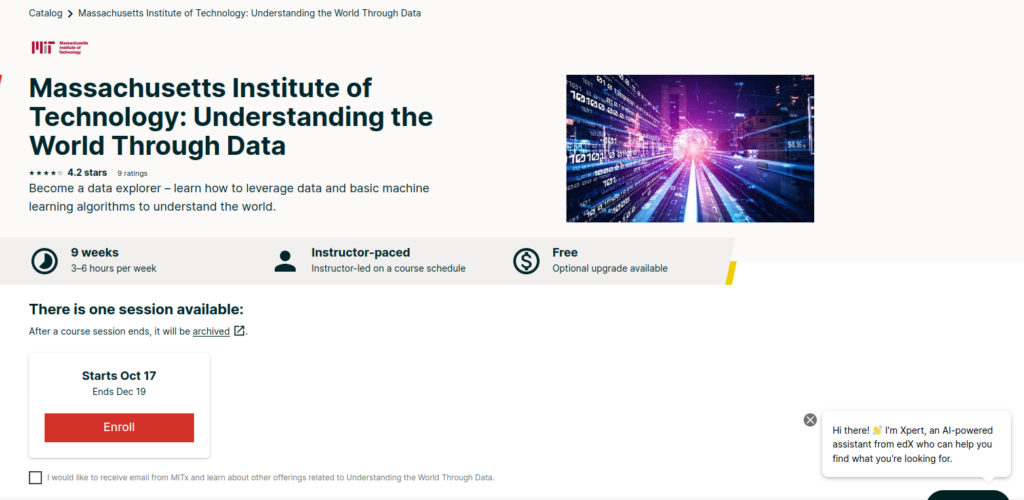
6. Computational Thinking for Modeling and Simulation
- Introduction to Computational Modeling: This course introduces students to the principles of computational modeling and simulation. Students learn how to create simplified digital representations of real-world systems and phenomena, allowing them to explore and experiment with various scenarios.
- Problem Abstraction and Decomposition: The course emphasizes breaking down complex problems into smaller, manageable components. Students learn how to identify the key elements of a system, abstracting away irrelevant details while retaining the essential aspects. This approach aids in designing effective models and simulations.
- Algorithmic Logic and Simulation Design: Students develop algorithmic thinking skills as they design simulations to model specific scenarios. They learn how to translate real-world processes into step-by-step instructions that a computer can follow. This involves making decisions about variables, parameters, and the logic that drives the simulation.
- Simulation Implementation: The course often involves hands-on coding and implementation of simulations using programming languages like Python, MATLAB, or specialized simulation software. Students gain experience in creating and running simulations, experimenting with different input values, and observing the resulting outcomes.
- Analysis and Interpretation: After running simulations, students learn how to analyze the generated data and interpret the results. This includes identifying trends, patterns, and unexpected behaviors that might provide insights into the system being modeled. Students also learn to validate their models by comparing simulation outputs with real-world observations.
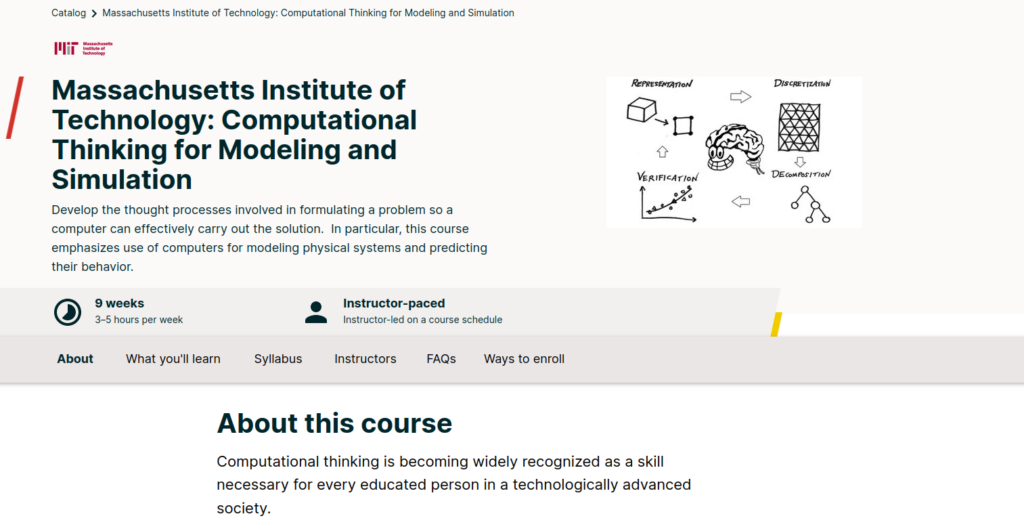
7. Becoming an Entrepreneur
- Startup Ecosystem Exploration: This course provides an in-depth exploration of the startup ecosystem, covering key aspects such as ideation, business models, funding sources, market analysis, and competitive landscape. Students gain a comprehensive understanding of the entrepreneurial journey from conception to growth.
- Idea Generation and Validation: Students learn techniques for generating and refining innovative business ideas. The course emphasizes the importance of validating ideas through market research, customer feedback, and prototype testing. This process helps students identify viable opportunities and potential challenges.
- Business Planning and Strategy: The course delves into the intricacies of business planning and strategy development. Students learn how to create a solid business plan, outlining key elements such as value proposition, target market, revenue model, marketing strategy, and operational considerations.
- Pitching and Communication: Effective communication is crucial for entrepreneurs. Students practice crafting compelling elevator pitches and business presentations that clearly convey their ideas to investors, partners, and customers. They learn to distill complex concepts into concise and persuasive messages.
- Entrepreneurial Mindset and Resilience: Becoming an entrepreneur requires a unique mindset characterized by adaptability, risk-taking, and resilience. This course focuses on fostering these qualities, teaching students how to embrace failure as a learning opportunity and navigate the challenges that come with building a business.
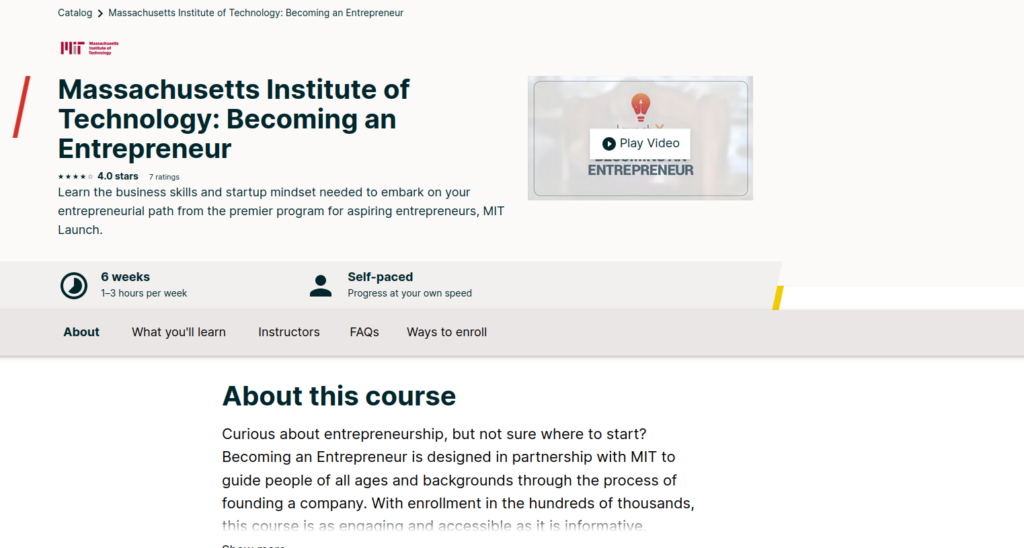
8.Entrepreneurship 101
- Market Segmentation: This course delves into the concept of market segmentation, teaching students how to divide a larger market into smaller, more manageable segments based on common characteristics such as demographics, behavior, and needs. Students learn the importance of tailoring their products or services to specific market segments.
- Bottom-Up Market Analysis: Students are introduced to the process of conducting bottom-up market analysis. This involves starting with individual customers and gradually aggregating their preferences and needs to build a comprehensive view of the entire market. This approach helps entrepreneurs gain a deep understanding of customer demand.
- Beachhead Market Analysis: The course covers the concept of a beachhead market, which refers to a specific segment within a larger market where a startup initially focuses its efforts. Students learn how to identify a viable beachhead market and develop strategies to capture it effectively, often serving as a launching pad for broader market penetration.
- Primary Customer Research: Students learn the importance of gathering primary customer research, which involves directly engaging with potential customers to gather insights, feedback, and preferences. This can be through surveys, interviews, focus groups, or observations. The course guides students on designing effective research methods and analyzing collected data.
- Profiling of Customer Persona and End User Profile: The course emphasizes the creation of detailed customer personas and end user profiles. Students learn to develop rich characterizations of their target customers, including their motivations, pain points, behaviors, and preferences. This information helps entrepreneurs design products and marketing strategies that resonate with their intended audience.
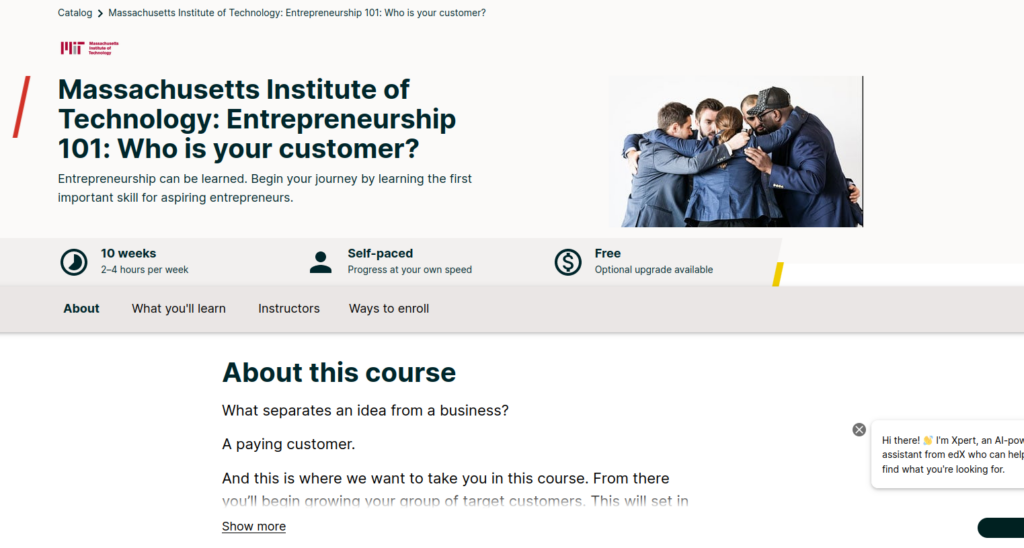
9.The Science of Uncertainty and Data
- Inference Methods: This course introduces students to various inference methods used to draw conclusions from data. Students learn how to make predictions, estimations, and decisions based on observed information, often involving statistical techniques that account for uncertainity.
- Probabilistic Calculations: Students delve into the world of probability theory, understanding how to perform probabilistic calculations to quantify uncertainty and likelihood. They learn to compute probabilities of events, conditional probabilities, and use techniques like Bayes’ theorem to update beliefs based on new information.
- Probabilistic Model Elements: The course covers the basic structure and elements of probabilistic models. Students learn about variables, parameters, likelihood functions, and priors. They explore how these elements come together to form a framework for understanding uncertainty and making data-driven decisions.
- Random Variables and Distributions: Students gain a deep understanding of random variables and their distributions. They learn to characterize and analyze different types of distributions, such as normal, exponential, and binomial distributions. This knowledge is fundamental for modeling and interpreting real-world data.
- Means and Variances: The course emphasizes the importance of means and variances in describing the central tendency and spread of data. Students learn how to calculate means and variances for various distributions and how these statistics inform decision-making and analysis.
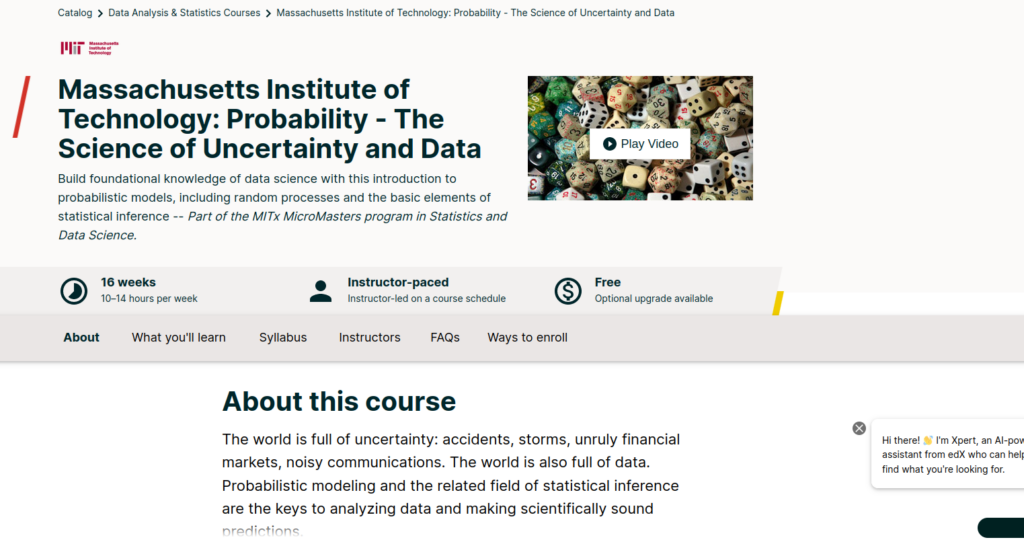
10. Foundations of Modern Finance
- Time Value of Money: This course delves into the concept of the time value of money, teaching students how to evaluate the worth of money over time and how to compare cash flows that occur at different points in time. Students learn about present value, future value, and the role of interest rates in financial decision-making.
- Risk and Return: Students explore the relationship between risk and return in the context of investments. They learn how to assess different investment options based on their potential returns and associated risks. Concepts like portfolio diversification and the risk-return trade-off are covered to help students make informed investment choices.
- Valuation of Financial Assets: The course covers methods for valuing various financial assets such as stocks, bonds, and derivatives. Students learn about techniques like discounted cash flow (DCF) analysis for valuing companies, as well as bond pricing methods. These valuation skills are fundamental for investment analysis and decision-making.
- Capital Asset Pricing Model (CAPM): Students delve into the Capital Asset Pricing Model, a key framework in modern finance that relates an asset’s risk and expected return to its market risk and the risk-free rate. This model helps students understand how assets are priced in the context of the broader market.
- Efficient Market Hypothesis: The course often introduces the concept of the Efficient Market Hypothesis (EMH), which suggests that asset prices fully reflect all available information. Students explore the different forms of market efficiency and the implications for investors seeking to beat the market.
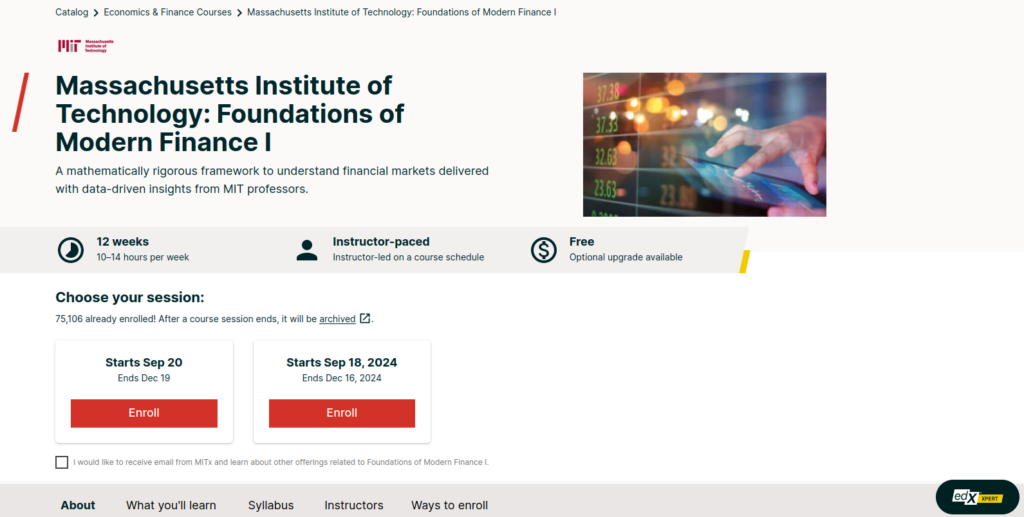
11. Entrepreneurship 103: Show Me The Money
- Funding Landscape: This course provides a comprehensive overview of the funding landscape for entrepreneurs. Students learn about different sources of funding, including bootstrapping, angel investors, venture capital, crowdfunding, and traditional loans. They gain insights into the pros and cons of each funding option.
- Pitching and Investor Relations: Students learn the art of crafting compelling pitches to attract investors. They understand how to effectively communicate their business idea, market opportunity, and growth potential. The course often covers the nuances of building investor relationships and responding to due diligence inquiries.
- Valuation and Term Sheets: The course covers valuation methods used to determine the worth of a startup. Students learn about key financial metrics and multiples that influence valuation, as well as the structure of term sheets that outline investment terms, ownership percentages, and rights.
- Negotiation and Deal-Making: Negotiation skills are crucial in securing favorable investment deals. Students learn negotiation strategies, techniques, and ethical considerations involved in deal-making. This includes understanding common terms, managing expectations, and reaching mutually beneficial agreements.
- Scaling and Financial Strategy: The course often explores financial strategies for scaling a startup with investment funds. Students learn how to allocate funds effectively, manage cash flow, and create financial projections that demonstrate the potential return on investment to attract investors.
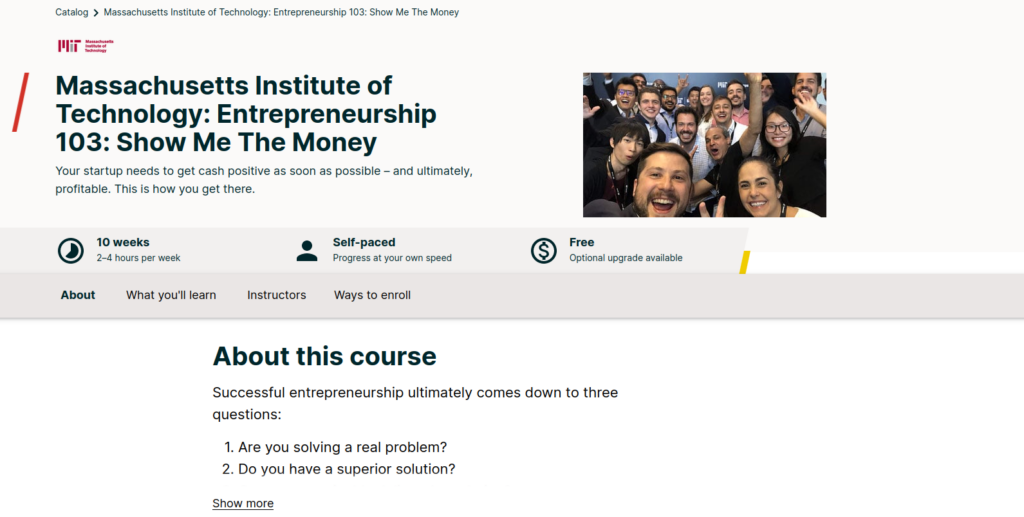
12. The Secret of Life
Biochemistry Fundamentals: This course provides a foundational understanding of biochemistry, covering the molecules and chemical reactions that underpin life. Students learn about essential biomolecules such as proteins, nucleic acids, lipids, and carbohydrates, as well as the role of enzymes and metabolism.
Genetics and Molecular Biology: Students delve into genetics, exploring the principles of inheritance, DNA replication, transcription, and translation. They learn how genes encode information for traits and how cells regulate gene expression to ensure proper functioning.
Recombinantion of DNA and Genetic Engineering: The course introduces students to the concept of recombinant DNA technology, which involves manipulating DNA sequences to create novel genetic combinations. Students learn about techniques such as gene cloning, PCR, and gene editing tools like CRISPR-Cas9, and how they are used in fields like biotechnology and medicine.
Genomics and Personalized Medicine: Students explore genomics, the study of an organism’s complete set of DNA, including genes and non-coding regions. The course often covers the role of genomics in understanding diseases, predicting genetic predispositions, and tailoring medical treatments to individual patients.
Ethical and Social Implications: Beyond the scientific aspects, the course often addresses the ethical and social considerations arising from advances in the field. Students discuss topics such as genetic privacy, genetic modification, and the impact of genetic information on society.
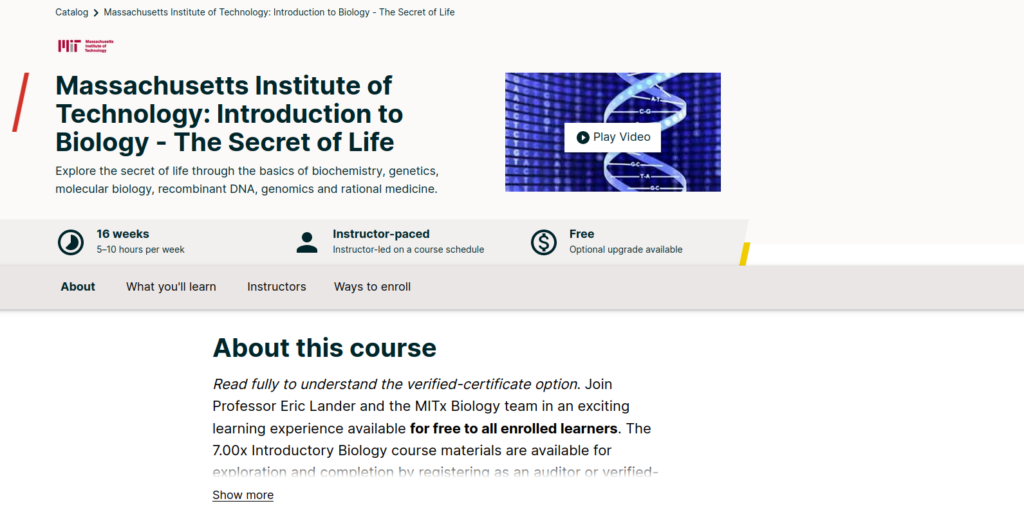
I highly recommend checking out these courses if you’re interested in learning about AI. They’re a great way to learn from the best, and they’re completely free!